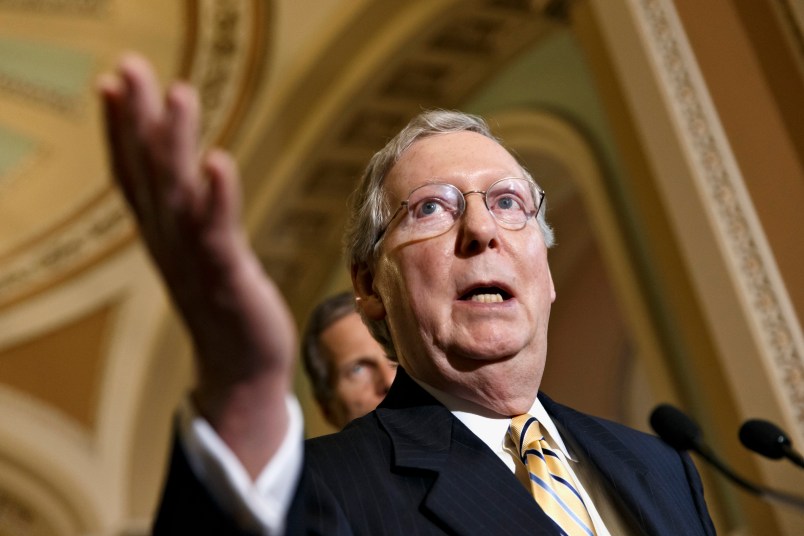The Supreme Court may have laid the groundwork for a constitutional crisis if Republicans win control of the Senate in the November elections, creating the possibility of a stalemate between the executive and legislative branches when it comes to keeping the government operational.
The landmark ruling in Noel Canning v. NLRB last week eliminated the president’s only fallback option to appoint leaders to government agencies when the Senate won’t act. The justices unanimously said the Constitution forbids the president from making recess appointments unless the Senate is officially on recess.
If Republicans control the Senate, they could stop President Barack Obama from naming anyone to a top government position by technically keeping the Senate in session even when members are out of town or on break. (These are known as pro forma sessions, when the Senate gavels in and out but doesn’t conduct business; the Supreme Court said the president may not make recess appointments during these periods.) In the worst case scenario, it could paralyze major federal departments and agencies.
“You could potentially end up with a real crisis of governance,” said Norm Ornstein, a congressional scholar with the American Enterprise Institute.
That isn’t an outlandish possibility. In fact it may be the logical next step for Republicans in their efforts to undermine President Barack Obama. As minority leader, Sen. Mitch McConnell (R-KY) has pioneered never-before-used tactics to thwart Obama’s nominees, including routine filibusters and a wholesale blockade of nominees to agencies that conservatives dislike. Last year, McConnell led the push to prevent confirmation of anyone to lead the Consumer Financial Protection Bureau and National Labor Relations Board, threatening to render the two agencies inoperable unless Democrats agreed to weaken their power.
As New York magazine columnist Jonathan Chait put it, “The modern pattern in American politics is that tactics that are legally available, but never used for reasons of custom, eventually become used. The modern pattern is also that the Republican Party, which is the most ideologically cohesive and disciplined party, leads the way. McConnell did not create this pattern, but he is an important innovator.”
McConnell’s efforts caused gridlock, and Democrats eventually responded by eliminating the 60-vote threshold for most nominations. But as majority leader, every Obama nominee would have to go through him in order to reach a full Senate vote. He’d be able to single-handedly block anyone, and the Supreme Court has taken away Obama’s last ditch option in the event of an impasse. Top government positions tend to be vacated more quickly during the final two years of a presidency as it fades into lame-duck status.
Justice Stephen Breyer didn’t contemplate this possibility in his opinion for the Court.
“What’s missing from this Supreme Court opinion is what happens if a Senate majority, for its own political purposes, decides to completely shut down the confirmation process,” Ornstein said. “What if it’s not an honest confirmation process? … Recess appointments now going away alters that balance.”
Animus between Obama and Republicans is at an all-time high and getting worse, with Speaker John Boehner planning to file a House lawsuit in the near future against the president for allegedly refusing to execute the law. Accusations of an overreaching president — rife in conservative circles — may further encourage a hypothetical Republican Senate majority to use the tools at their disposal against the president.
The prospect of a confirmation logjam becomes even likelier if a Supreme Court justice needs to be replaced in Obama’s final two years, given the enormity of the stakes and the fragile balance of the Court on many monumental issues.







Always remember “What Goes Around Comes Around”.
Democrats don’t have the guts to use these tactics. And they certainly don’t have the “sales skills” to use them and be able to get away with it politically, as Republicans do.
Does “adjourn” mean to recess? Or do they mean different things? The issue here is about the President’s power to make appointments when the Senate is not officially in recess. If Obama were to use the power you just described to “adjourn” the Senate, couldn’t Mitch McConnell promptly call it right back into session and do a pro-forma session?
@TheyAllStink16. If they were ready for it the GOP could. But many times they just gavel in for the day and leave. The POTUS could wait until said Senator leaves the dais and promptly adjourn and immediately afterwards recess appoint his picks. The only protection against this maneuver would be to keep Senators on the floor at all times (including holidays). In effect only a “talking filibuster” could prevent the POTUS from undertaking this action.
No one states the patently obvious like Kapur.